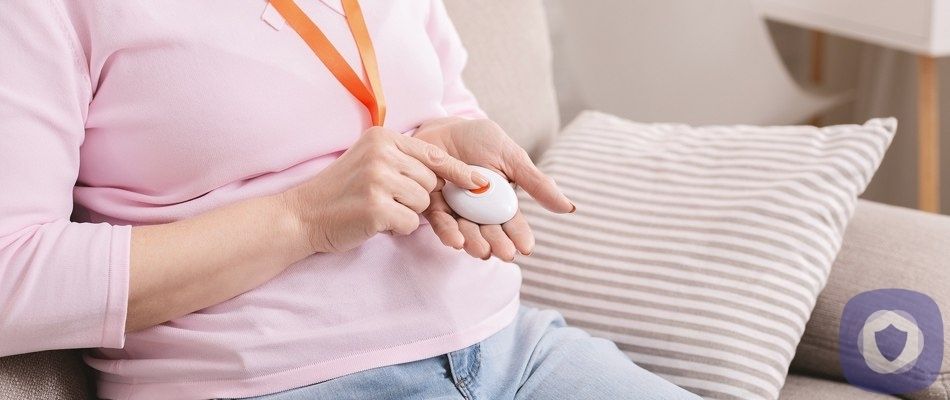Medical alert devices can literally save lives. Whether you want to protect a loved one or yourself with one, know that it’s often a good idea. In a dire emergency situation, medical alert devices provide a surefire way to get in contact with authorities, even when the user is alone without a cell phone or other way to get help.
Medical alert devices aren’t only for elderly loved ones who may need increased supervision or emergency response. They can be utilized for anyone with a health issue that is at risk for needing emergency assistance at a moment’s notice. These life-saving products range from at-home devices to meant to be used on the go that can track the user’s location to provide to first responders.
Here, we explain the types of alert technology on the market today and how they work. Plus, what features to look for depending on your wants, needs and budget.
How do medical alert devices work?
Medical alert products range from a button placed in your home to a wearable GPS bracelet that can track your every move in an emergency situation. The overall goal is to ensure the user gets help immediately, either from a loved one or a first responder.
When the user indicates there is trouble, one of two things can happen: If the device is professionally monitored, the call will be sent to either a help center or directly to 9-1-1, depending upon the product. If the device is not professionally monitored, the user will alert designated family members or friends that help is needed. So, if you’re wondering: how exactly do medical alert devices work? Know that it depends on the technology the device uses. There are several to choose from:
- Landline devices: Although landline-compatible options tend to be the most basic, one may be all you need if you’re looking for a low-cost medical alert device for someone who doesn’t have severe medical needs. These work with your phone landline, and generally have a limited range throughout your home in which you can press the button, although in some cases you can purchase extenders. Because this type of device uses a landline, it may be ideal for those with poor cellular service.
- Cellular connectivity: Some devices operate via a cellular signal, which gives more flexibility in general. The medical alert devices with cellular connectivity can work outside the confines of your home so the wearer can get help when they need it.
- GPS technology: Not all medical alert devices have GPS, but the ones that do are great for an active senior, or someone who leaves home and could be difficult to contact. This can give loved ones and first responders an exact location should the user stop responding, or if the person is unable to communicate through voice.
Types of medical alert devices
Medical alert devices come in a range of styles and options. You should choose a product based on your specific circumstances and how you foresee needing help in an emergency. Some features to consider include:
Mobile communication
If you’re looking to monitor a loved one who is homebound, you likely wouldn’t need to purchase a mobile device and could go with a home-based device. Alternatively, if you have an active senior or someone with a medical condition such as seizures, you will likely want a device that can work outside of the home. This way, if the person is in an emergency situation, the device can be detected, whether they’re at work, buying groceries, or anywhere else.
Professional monitoring
Purchasing a medical device with professional monitoring is preferred in many cases, because this gives the wearer access to emergency aid even if a loved one or friend is not available. While unmonitored options can work well for people without health conditions, or those who are not alone often, a monitored device provides reassurance that emergency assistance can be notified no matter the time of day or night.
Fall detection
What happens if you or your loved one falls and can’t press a button on the device to call for assistance? Automatic fall detection technology is made to alert either the monitoring company or loved ones that a person has fallen. This can be a life-saving feature that is worth having if it fits your needs.
Back-up battery
The battery life on medical alert devices can vary from product to product. Having one with a back-up battery ensures that if the main battery runs low or runs out, you’ll still have protection.
Waterproof
According to the Centers for Disease Control and Prevention, over 225,000 people every year visit emergency rooms because of falls in the bathroom. You should have a medical alert device that is waterproof and can be taken into the shower for these very instances.
Activity monitoring
Maybe you’re monitoring a parent or a loved one who is recovering from a serious illness. Even as a caregiver, you may not be able to check in often, so an activity tracker can be valuable to know if there’s trouble while you’re away. For example, if the person being monitored hasn’t moved for an extended period of time, it may be time to check in to make sure everything is alright.
Two-way communication
Some medical alert devices provide two-way communication, which can help first responders know exactly the problem they are responding to. It can be helpful too, at times of false alarms, to tell dispatchers that all is okay.
Mobile apps
A mobile app can be especially helpful for keeping tabs on loved ones. Certain brands provide an app that allows people to see activity and get updates.
Related: Check out our picks for the best medial alert systems
How to buy a medical alert systems
You can buy a medical alert device from a company that specializes in making them, or you may purchase one as an add-on to your home security system. When deciding on which one is right for you and your loved one, factor in:
- Price: Medical alert devices are generally very affordable. The more features you add on, the more the price will rise. When purchasing a medical device on its own, it can range anywhere from under $20, to over $200. But monthly monitoring will add anywhere from $19.95 to $39.95 to the purchase on average. In some cases, if you sign on for the monitored option, you can either get the actual equipment at a discount or even for free.
- Style: Would you prefer your device to be in the form of a keychain to have easily accessible while driving your car, or a bracelet or necklace to wear at all times while doubling as a help button? The user’s health and personal preference should be major factors in your decision. (You may want to read our guide on panic pendants if these are of particular interest.)
- Health conditions: Choose a medical alert device that works best with the health condition or need that the user has. For example, for someone with dementia who has a risk of getting lost, GPS would be a must-have feature. If you have someone who isn’t able to communicate well verbally, perhaps two-way communication wouldn’t be your top choice, and activity tracking would be a better option.
- Lifestyle: Is the person who is using the product active, or are they home-bound? Is there a high likelihood they could fall? Think about features like GPS, cellular connectivity, and waterproofing if you’re looking to keep a more active person safe. These types of questions may help you decide whether you need to have professional monitoring as well.
- Security system: Do you already have a home security system? You may be able to add a medical alert device onto your monthly bill for a lower price than getting a medical alert device from another brand.
Medical alert devices: The bottom line
When it comes to choosing the right medical alert device, the choice is a personal one. You should take into account all the needs of the person you want to protect to figure out which features are worth purchasing, and which ones may not be worth the extra money.
Some users may not need the additional reassurance of monthly monitoring if there are not dire medical risks involved. However, in cases of elderly loved ones, or people with recurring health issues, the monthly monitoring has the potential to literally save a life. Features like GPS and fall detection are add-ons to seriously consider to give yourself extra peace of mind.
This article has been reviewed and approved by Officer Banta.

Officer Banta is the official SecurityNerd home security and safety expert. A member of the Biloxi Police Department for over 24 years, Officer Banta reviews all articles before lending his stamp of approval. Click here for more information on Officer Banta and the rest of our team.

